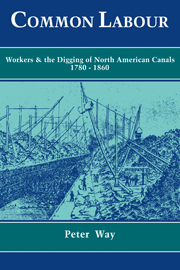Crossref Citations
This Book has been
cited by the following publications. This list is generated based on data provided by Crossref.
Lucassen, Jan
1994.
The Other Proletarians: Seasonal Labourers, Mercenaries and Miners.
International Review of Social History,
Vol. 39,
Issue. S2,
p.
171.
Way, Peter
1994.
Labour's Love Lost: Observations on the Historiography of Class and Ethnicity in the Nineteenth Century.
Journal of American Studies,
Vol. 28,
Issue. 1,
p.
1.
Hanes, Christopher
1996.
Turnover Cost and the Distribution of slave Labor in Anglo-America.
The Journal of Economic History,
Vol. 56,
Issue. 2,
p.
307.
Marquis, Greg
1997.
The ‘Irish model’ and nineteenth‐century Canadian policing.
The Journal of Imperial and Commonwealth History,
Vol. 25,
Issue. 2,
p.
193.
Weinhauer, Klaus
1997.
Labour Market, Work Mentality and Syndicalism: Dock Labour in the United States and Hamburg, 1900–1950s.
International Review of Social History,
Vol. 42,
Issue. 2,
p.
219.
Peck, Gunther
1998.
Divided Loyalties: Immigrant Padrones and the Evolution of Industrial Paternalism in North America.
International Labor and Working-Class History,
Vol. 53,
Issue. ,
p.
49.
Kenny, Kevin
2001.
A Companion to 19th‐Century America.
p.
164.
2001.
A Companion to 19th‐Century America.
p.
359.
Spongberg, Mary
2002.
Writing Women’s History since the Renaissance.
p.
189.
Rosenbloom, Joshua L.
2002.
Looking for Work, Searching for Workers.
Glymph, Thavolia
2003.
Out of the House of Bondage.
Valenzuela, Abel
2003.
Day Labor Work.
Annual Review of Sociology,
Vol. 29,
Issue. 1,
p.
307.
Popper, Deborah Epstein
2005.
Poor Christopher Colles: An Innovator's Obstacles in Early America.
The Journal of American Culture,
Vol. 28,
Issue. 2,
p.
178.
Tyrrell, Ian
2007.
Transnational Nation.
p.
20.
Einhorn, Robin L.
2008.
Slavery.
Enterprise and Society,
Vol. 9,
Issue. 3,
p.
491.
Varsanyi, Monica W.
2008.
Immigration Policing Through the Backdoor: City Ordinances, the "right to the City," and the Exclusion of Undocumented Day Laborers.
Urban Geography,
Vol. 29,
Issue. 1,
p.
29.
Cobble, Dorothy Sue
2012.
The Promise and Peril of the New Global Labor History.
International Labor and Working-Class History,
Vol. 82,
Issue. ,
p.
99.
Gleeson, David T.
2013.
A Companion to the Era of Andrew Jackson.
p.
454.
Tyrrell, Ian
2015.
Transnational Nation.
p.
23.
Kelly, James
and
Bartlett, Thomas
2018.
The Cambridge History of Ireland.





